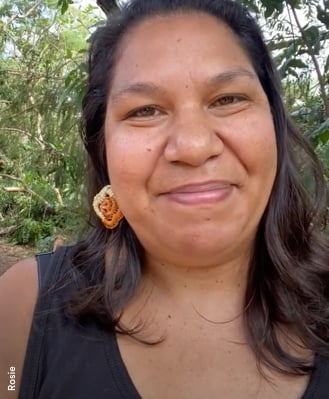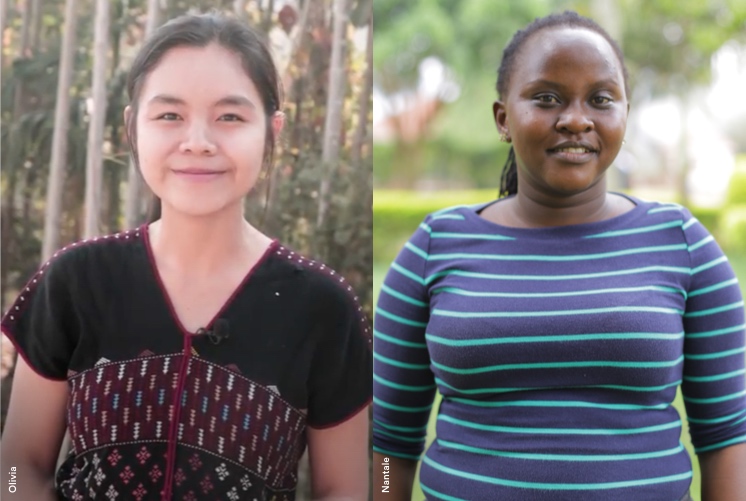8 March 2021
Made of Women: Educating the next gen
We’re celebrating International Women’s Day 2021 by highlighting the women in our community who inspire and empower us.

Empowerment starts with education. Through the Cotton On Foundation, we support quality education programs around the globe to give young students, especially girls, the best start in life. We partner with communities to provide long-term opportunities across education, health, sustainability, and infrastructure. It goes beyond the classroom, and it wouldn’t be possible without the support of amazing women on the ground.
Rosie
Rosealee Nyilapa Grimes, Yolŋu woman & student mentor. Yirrkala, Australia.
Tell us about Yirrkala, Northern Territory
We are in the middle of the wet season at the moment. I love the colour of the red earth and the new shoots of green foliage. Yirrkala is a beautiful fierce melting pot of different clan groups and families across East Arnhem Land. One of my favourite and one of the most beautiful places to visit here is Buku-Larrŋgay Mulka Art Centre. You need to visit to believe it.
“By educating women in our communities we also educate the entire community and the nation prospers. We need to educate our young women to ensure our families stay healthy.”
How important do you think it is for kids to have access to the Arts through programs like the Mulka Project?
The STARS Foundation is an in-school support program for young Indigenous women. We provide them with help during class, teach students life skills, and help with getting students to school. Most importantly we impart knowledge on how to live healthy, active lives, that education is the key to success and community contribution.
Tell us about your role with the STARS Foundation
We are in the middle of the wet season at the moment. I love the colour of the red earth and the new shoots of green foliage. Yirrkala is a beautiful fierce melting pot of different clan groups and families across East Arnhem Land. One of my favourite and one of the most beautiful places to visit here is Buku-Larrŋgay Mulka Art Centre. You need to visit to believe it.
What empowers you?
Education empowers me. The more I learn the more I begin to understand how I can shape my future, my son’s future and my community’s future.
“We can be creative in a space where Yolŋu have control over the content that is being created and shared throughout the world.”
— Rosie, Yolŋu woman & student mentor.
Olivia
Primary school teacher. Bwe K’Lar Learning Centre, Thailand.
Tell us about your role
I was born in Myanmar but came to Thailand in 2013 and have been teaching at the Bwe K’Lar Learning Centre ever since. My role at Bwe K’Lar is a combination of teaching, planning, managing finances and supporting the school as needed by the principal. I love teaching and working with the students the best.
Tell us a bit about the Bwe K’Lar Learning Centre
When Bwe K’Lar was first built, the funding of the school was insufficient. Now, after many years [with the support of the Cotton On Foundation], the school has been renovated and has a new building and new playgrounds within the school compound.
What impact has the Bwe K’Lar Learning Centre had on the local community?
Parents better understand the value of education, especially in migrant communities, and are more involved with school activities now. Our students support the community in cleaning, planting trees and preserving the environment. Similarly, by giving and reaching out to the community, community leaders pay more attention to the school and support us when we need their help.
Why is access to a quality education important for young people?
Having access to education helps free us from poverty and hunger, and is the foundation for more job opportunities and a better life. Education is the most important thing for younger people.
“There are many parents from Myanmar who live in the community, whose children are not able to be enrolled in Thai schools. These parents send their children to Bwe K’Lar.”
— Olivia, Primary school teacher

Nantale
Nantale Jane, Counsellor. Rakai, Southern Uganda.
Tell us a bit about what you do
I am currently working as a school counsellor based in the Rakai district. I listen to students’ concerns and help them set goals and problem solve. I also provide counseling to parents around supporting their children in school.
“The most rewarding part of my role is knowing that I have a part in affecting the life of others.”
What are some of the challenges facing young women in your community?
The biggest challenges young women face in my community is the provision of basic necessities, such as sanitary towels, underwear and bras. Another challenge is female students dropping out of high school to look after siblings and the home. Some parents still believe this is what a girl is supposed to do, while their sons are the breadwinners of the house.
Tell us about the hopes and dreams the women you work with have
Many of the women I have worked with have high hopes of becoming professionals that can meaningfully serve their communities. For example, teachers, doctors, nurses, social workers, engineers, or medics. Some current senior students are even opting to do psychology as a result of continuous interaction and witnessing my success with my career.
What’s the best part of your role?
Inspiring young people to become all that they are capable of being, so they’re able to go out into their communities and help others that have not had the same opportunities. My aim is to ensure the student’s well-being, alongside a holistic and quality education, so as to empower them to become contributing citizens.
“I feel most empowered when I take part in decision-making. In my family, at work, in my personal life or religion.”
— Nantale Jane, Counsellor.
Sinenhlanhla
High school student. South Africa.
Tell us about yourself
My name is Sinenhlanhla Zulu, or MaZulu. I love reading novels. My three favourite writers are John Kani, Francine Pascal and Jay Shetty, the motivational speaker. I love speaking English, as I regard it as a communication language.
Tell us about your school
My school is a mini-disadvantaged school trying by all means to give us a better life. It feeds those in need. Dr JL Dube has tried its best to give its learners and the community a better future.
When do you feel most empowered?
I feel most empowered during my Life Orientation lessons, because I get to talk about challenges teenagers face, interpersonal and intrapersonal. It’s when we get to find or create our own path.
What advice would you give your fellow graduating students?
No matter how far wrong you've gone, you can always turn around. Everything you do makes a difference, but it’s up to you to decide what kind of difference you want to make.
“My dream is to be a linguist and to give back to the community that raised me.”
— Sinenhlanhla, High school student. South Africa.






